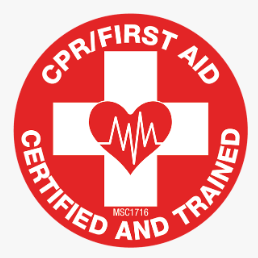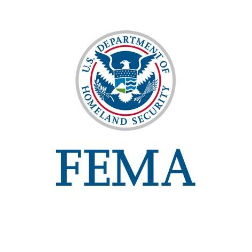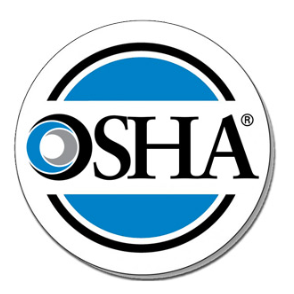EMT / EMS
Tentatively Starting 2026 - 2027
A career in emergency medical services is more than a job—it’s a calling to serve others in their greatest moments of need. EMTs are trained to make quick, life-saving decisions, providing emergency care and calm leadership in high-pressure situations. The work can be physically and emotionally demanding, but it is also deeply rewarding because every response has the potential to save a life. Students in our program begin developing the medical knowledge, critical thinking, and teamwork skills essential for success in this field.
Tentatively scheduled to begin in the 2026–2027 school year, our Emergency Medical Technician program will be part of the South Carolina Health Science Career Cluster. This one-year program prepares students to earn certifications such as First Aid, CPR, and Stop the Bleed, and to qualify for the National Registry EMT (NREMT) examination. Instruction includes classroom learning, lab simulations, and clinical experiences that prepare students for real-world emergencies and a future in healthcare or public safety.
What you’ll do:
- Learn the history, structure, and roles of emergency medical services
- Study anatomy, physiology, and patient assessment for trauma and medical emergencies
- Practice lifesaving skills such as CPR, bleeding control, and airway management
- Participate in lab simulations and clinical experiences that prepare you for real-world emergency response
- Explore career opportunities in emergency medicine, firefighting, and public safety
Certifications you can earn: (Subject to change)
- Tier 1: OSHA-10, Stop the Bleed
- Tier 2: First Aid/CPR/AED, Healthcare Providers Basic Life Support (BLS)
- Tier 3: Emergency Medical Technician (EMT) Certification
Students earn two high school credits over the course of the year. Credits count as electives toward South Carolina graduation requirements, and one credit may fulfill the CATE/Foreign Language requirement.
EMT / EMS 1 & 2: Full One-Year Program — Start to Finish
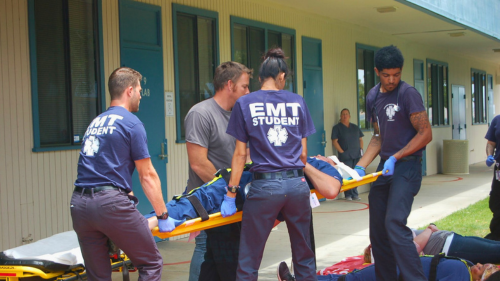
EMT / EMS 1 & 2 — (AM and PM Session at Enoree)
Emergency Medical Technician (EMT) introduces students to the fundamentals of emergency medical services in a one-year program that blends classroom instruction, lab practice, and clinical experience. Open exclusively to 12th grade students, participants attend Enoree Career Center during the morning session and earn two high school credits upon completion. The course focuses on safety, professionalism, communication, and teamwork while building the essential knowledge and skills needed for success in healthcare and emergency response careers. Students must be at least 17 by the course start date and 18 with a high school diploma to apply for state EMT certification.
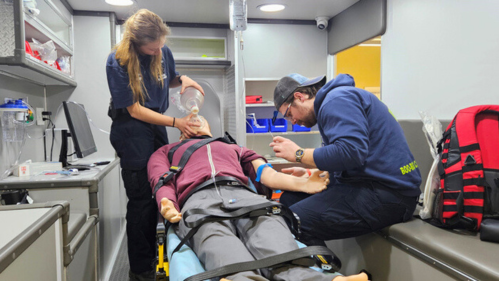
Students learn patient assessment, trauma care, and emergency medical procedures while completing clinical hours and ambulance ride-alongs that build confidence and real-world readiness. Instruction includes anatomy and physiology, medical terminology, and scenario-based simulations designed to strengthen decision-making and problem-solving in high-pressure situations. Emphasis is placed on compassion, accuracy, and leadership—qualities vital to any medical professional.
By the end of the course, students will have completed Emergency Medical Responder, EMT-Basic (National Registry), First Aid/CPR/AED, and First Responder certifications. Students who meet all program and age requirements will be eligible to apply for South Carolina EMT certification after graduation. Graduates leave the program with professional credentials, practical experience, and a strong foundation for future careers as EMTs, paramedics, or other healthcare professionals.
Career Opportunities


Emergency Medical Technician (EMT)
Emergency Medical Technicians are first responders who provide life-saving care during medical emergencies. They assess patients, perform CPR, control bleeding, stabilize injuries, and transport individuals to medical facilities for further treatment. EMTs work closely with hospitals, firefighters, and law enforcement to ensure rapid and effective emergency response. This role builds the foundation for many healthcare careers, offering real-world experience in patient care and medical decision-making.
Salary: $40,000–$55,000 per year on average, or $19–$26 per hour
Paramedic
Paramedics are advanced-level emergency medical professionals who provide high-quality pre-hospital care in critical situations. They perform advanced airway management, administer medications, and interpret heart rhythms while leading emergency response teams. Paramedics often work in ambulances, hospitals, and rescue operations, and many continue their education to become nurses, physician assistants, or other healthcare providers.
Salary: $50,000–$70,000 per year on average, or $24–$34 per hour
Emergency Room Physician
Emergency Room (ER) Physicians diagnose and treat patients with acute injuries and illnesses in hospital emergency departments. They provide immediate care, oversee emergency teams, and coordinate treatment plans for patients in crisis. Many ER doctors begin their journey as EMTs or paramedics, gaining vital field experience that strengthens their clinical decision-making and patient care skills.
Salary: $230,000–$310,000 per year on average, or $110–$150 per hour
Job Skills & Requirements
Each skill and trade requires a specific skill set to master the content and job tasks. Below are a few critical skills and requirements needed to succeed in the program and throughout a career in this field.
- Adaptability: Medical emergencies are unpredictable. EMTs must quickly adjust to changing conditions, patient needs, and environments while maintaining focus and composure.
- Communication: Clear, calm, and compassionate communication is vital when interacting with patients, families, and medical professionals. EMTs must relay accurate information quickly to ensure effective care.
- Decision-making: In high-pressure situations, EMTs rely on training, critical thinking, and sound judgment to make rapid decisions that can save lives.
- Emotional control: Maintaining composure in stressful or emotional situations allows EMTs to perform effectively and provide reassurance to those in crisis.
- Teamwork:Emergency care depends on collaboration. EMTs work closely with partners, paramedics, nurses, and physicians to coordinate responses and deliver the best possible patient outcomes.
Available Certification Opportunities
(Click logos below for more information)
Local Work-Based Learning Partners
(TDB after Program Implementation)
NOTE: Credits earned will count as electives needed for the SC high school graduation requirements. One of the credits earned may fulfill the CATE/Foreign Language requirement for SC high school graduation. Most 4-year colleges will NOT accept career center courses as a substitute for the foreign language college admissions requirement.
